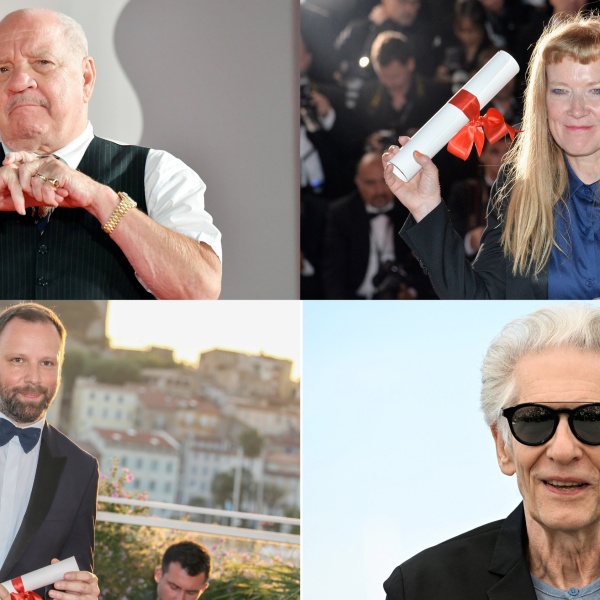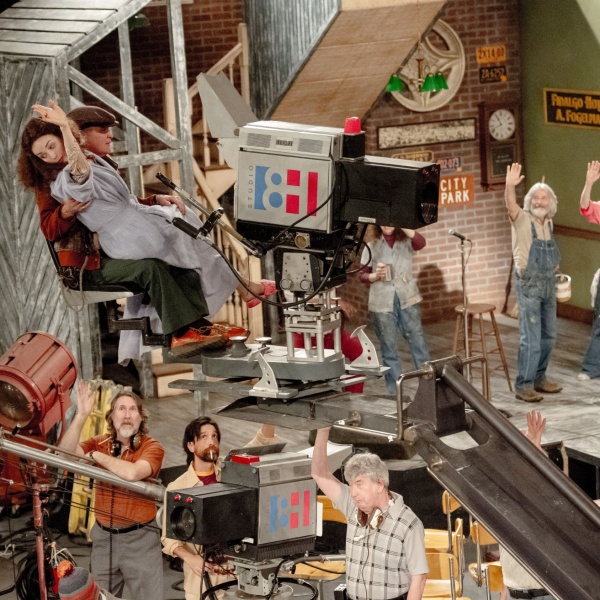“Does it not strike you as odd that she should play so wonderfully? Play Beethoven with such passion? And live so quietly? I suspect one day music and life will mingle.”
The Reverend Mr. Beebe says that about Lucy Honeychurch in “A Room with a View,” but he also could have been describing James Ivory, that film‘s now-96-year-old director. A quiet, searching child of Klamath Falls, Oregon, Ivory felt deeply, but found art to be the vessel for his emotion. And he was the precise opposite of his partner in life and in work, producer Ismail Merchant, boisterous and in-your-face charismatic, capable of getting money out of anybody and able to run productions of the highest possible production value on the lowest available budget. Think Roger Corman if he’d grown up in India in a Muslim family and dedicated his life to thoughtful, challenging costume dramas.
In his documentary, “Merchant Ivory,” Stephen Soucy pays tribute to this extraordinary duo who went on to make “Maurice,” “Howards End,” and “The Remains of the Day.” It’s certainly full of affection and care for the lives they lived — Ivory, though a pioneer in LGBT cinema with 1987’s “Maurice” especially, barely talked in public about his sexuality until the release of “Call Me by Your Name” in 2017, for which he won an adapted screenplay Oscar — while admiration for their work is presented as a given. Maybe Soucy’s right: If you’re already watching a documentary about Merchant Ivory Productions, you don’t need to be told that their films are great.
But this sloppy, scattered documentary, very much lacking the refinement of Merchant Ivory’s own films, is a missed opportunity to explore why their films are great, what exactly is it that makes viewers return to them time and time again. It’s the problem of Stephen Kijak’s 2023 doc, “Rock Hudson: All That Heaven Allowed,” all over again — a lot of attention paid to the subjects’ personal lives, much less about why those subjects were great artists.
The problem with “Merchant Ivory” is that it’s good at identifying all the ingredients that made for their great films, but not as much about the exact alchemy of how these elements came together to produce something extraordinary. Soucy’s interviewed dozens of cast and crew from their films (perhaps too many) and gets great moments about what it would have been like to be on a Merchant Ivory set: Ismail Merchant himself cooking meals for everyone (to save money); Ivory’s understated direction to his actors; Merchant worrying that Ivory was taking too long to set up a shot and yelling at him, “Shoot, James! Shoot!”
In one of the new interviews Soucy conducted, Hugh Grant talks about the joy of working on “Maurice” and how film sets back then “crackled with subliminal lust,” as opposed to everyone just looking at their phones in down moments now. Some of the interviews are more successful than others: Soucy presents a moment of Vanessa Redgrave pushing back on him because she wants her interview to be the best that it can be as a sign of how difficult she must have been to work with on “The Bostonians.” But, of course, she couldn’t have been that difficult, because Merchant and Ivory hired her again eight years later for “Howards End” and even that much later for “The White Countess.”
This is Soucy’s first feature-length documentary, after a number of shorts, including a short documentary about the music of Merchant Ivory’s films, and what he lacks in skill he makes up for with love for his subject matter. It does make for interview answers from Emma Thompson and Helena Bonham Carter, among others, that emphasize just what a jolly good time they had making these films and not going vastly deeper beyond the surface than that. Which gets back to the fatal flaw of “Merchant Ivory.” The film shows how the duo helped kick off the period costume-drama craze that has existed ever since… but it doesn’t really examine how Merchant Ivory’s costume dramas are largely superior to everyone else’s costume dramas. There is a massive difference in quality between “A Room with a View” and “Downton Abbey.”
Most costume dramas these days are escapes. Merchant Ivory’s films were interior journeys about characters with richly drawn internal lives — journeys that often happened to be set in exquisite environs. “A Room with a View” is one of cinema’s supreme elaborations about what it means to not know your own mind. Because Lucy Honeychurch is unable to know herself or what she wants, she’s unable to drive the plot forward, resulting in a film of moments and digressions rather than a hard-charging narrative. It completely flies against the entire plot-industrial complex that’s dominated the industry ever since, and unthinkable without Ruth Prawer Jhabvala as the film’s screenwriter, who brought a novelist’s sensibility to her scripts more than anyone ever. (Soucy does an excellent job of considering Jhabvala’s contribution as well as that of composer Richard Robbins — all the more difficult because they, as with so many of those involved in these films including Merchant himself, are deceased.) Imagine if the central characters in “Downton Abbey” never found fulfillment the way Anthony Hopkins’ butler doesn’t in “The Remains of the Day”? Simply because he doesn’t have the bravery to “go for it.” Imagine if the Abbey was shuttered altogether because Lord Grantham had become a Nazi supporter?
It’s understandable that Soucy would not want to denigrate other films. But such an implication would have been conveyed simply by assessing a little more deeply what made Merchant Ivory’s own films so very special. Music and life did mingle in their work. And, to paraphrase Mr. Beebe again, it was very exciting for us indeed.
Grade: C+
“Merchant Ivory” opens in New York City and Los Angeles on Friday, August 30.
Want to stay up to date on IndieWire’s film reviews and critical thoughts? Subscribe here to our newly launched newsletter, In Review by David Ehrlich, in which our Chief Film Critic and Head Reviews Editor rounds up the best reviews, streaming picks, and offers some new musings, all only available to subscribers.








